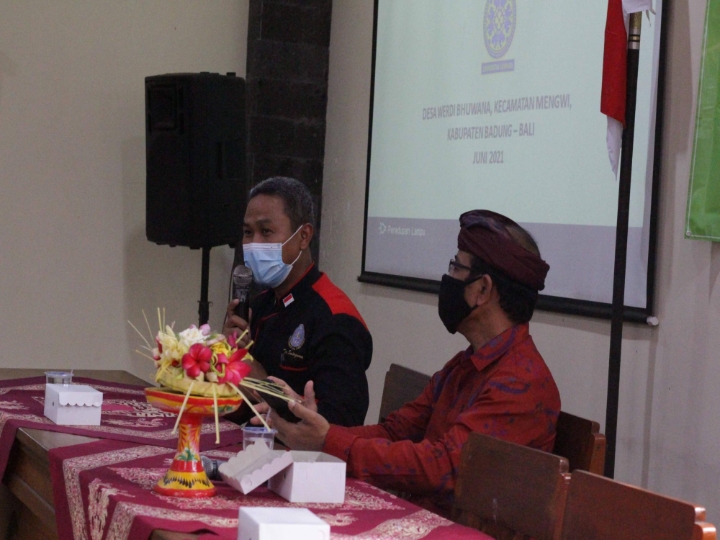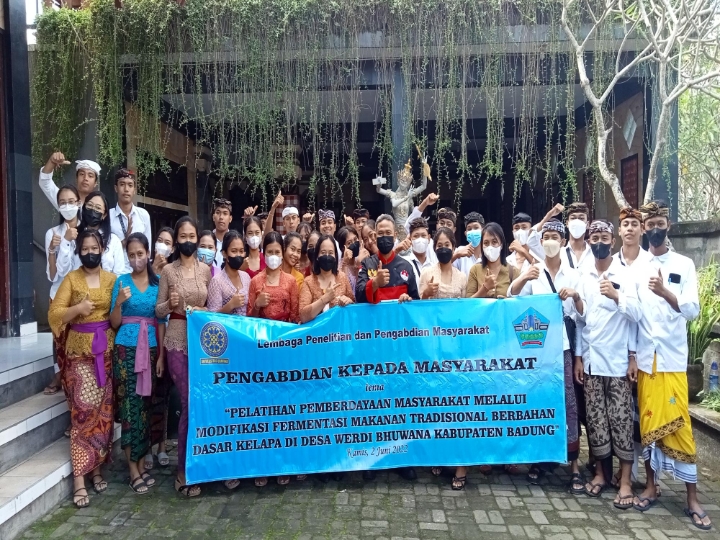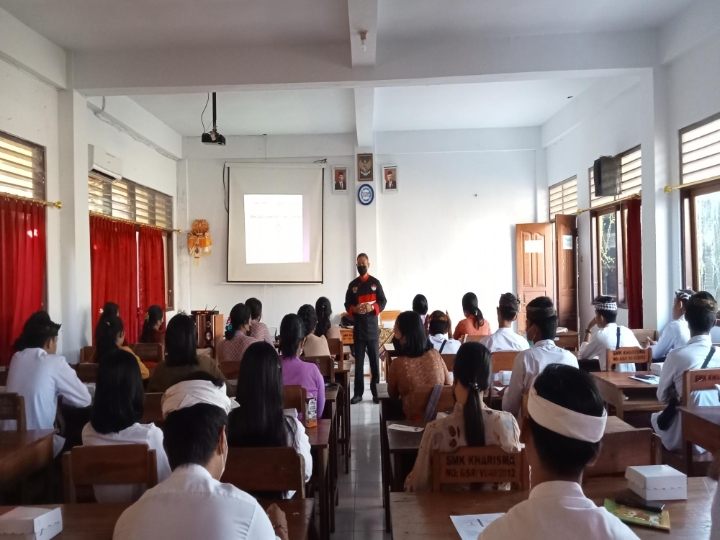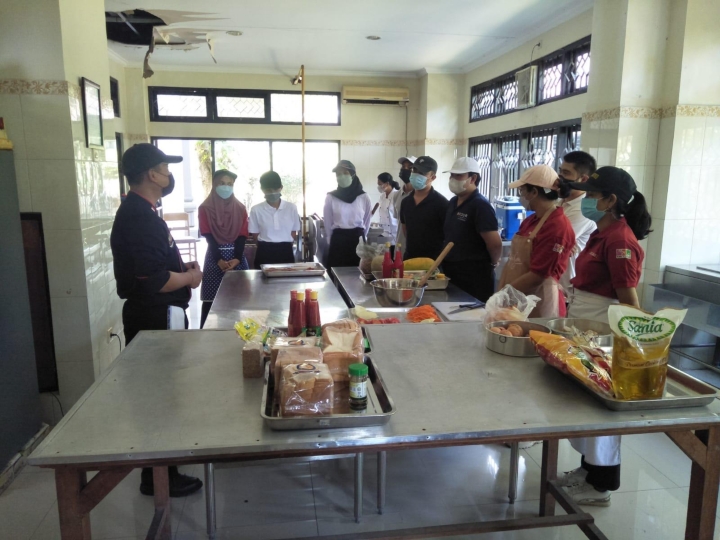MODIFICATION OF TRADITIONAL FERMENTATION OF COCONUT-BASED FOOD IN WERDI BHUWANA VILLAGE, BADUNG DISTRICT, BALI
27/01/2023 Views : 257
I Nyoman Tri Sutaguna
MODIFICATION OF TRADITIONAL FERMENTATION OF COCONUT-BASED FOOD IN WERDI BHUWANA VILLAGE, BADUNG DISTRICT, BALI
I Nyoman Tri Sutaguna
Werdi Bhuwana Village also has traditional dishes and drinks that can be used as culinary tours (culinary tourism). Very high appeal is not only in the form of food products and tastes good, but also in the method of processing food ingredients from raw materials to the food in the process of serving it. This business could be in the form of eating together (dinner, lunch, etc.), opening a restaurant, opening coffee shops in strategic locations in the village, exploring the characteristics of Balinese specialties such as megibung, and so on.
Based on this, it is necessary to develop a Balinese food business in Werdi Bhuwana Village, Mengwi District, Badung Regency, as a facility to connect with tourists and promote culinary tourism. This activity aims to educate residents of Werdi Bhuwana Village about various Balinese specialties that are good and can meet the needs of tourists and support culinary tourism in the development of Werdi Bhuwana Village as a tourism village.
The Mengwi Village Head/Lurah along with his staff, and PKK women came to the community service activities in Werdi Bhuwana Village. They were very enthusiastic about participating in the dedication training from start to finish. The practice of modifying traditional Balinese food so that it can be served and enjoyed by tourists. This community service activity began with counseling about the development of culinary tourism in Werdi Bhuwana Village, Mengwi District, Badung Regency. This helped community leaders, village heads/ Lurah, staff, and PKK women in Werdi Bhuwana Village, to learn a lot about this topic.
"Training for Community Empowerment Through Modification of Fermentation of Traditional Coconut-Based Foods in Werdi Bhuwana Village, Badung Regency" is a community service topic whose content places more emphasis on the capabilities of plantation products. This can be tried by seeking support from agricultural and plantation products, as well as being able to support the woodcraft industry through culinary tours.
In this counseling, descriptions of culinary tourism were informed in advance so that residents, especially PKK women who were present, better understood and mastered culinary tourism itself. The words "tourism" and "culinary" form the basis of the term "culinary tourism." The behavior of traveling to other countries or regions with the aim of having fun. Culinary tourism means a tourist trip carried out by a person or group of people to a tourist destination, where they (tourists) will enjoy traditional food from the place visited. Culinary tourism is nothing new; This is connected with agro-tourism, which focuses on agricultural and plantation products. However, culinary tourism is more concerned with how a food or drink can attract tourists to enjoy it.
There are several reasons why culinary tourism is very meaningful, including: 1) During tourism activities, almost all tourists eat out; 2) Eating out is a favorite activity of tourists; (3) The amount of money spent on eating and drinking will exceed the total amount paid by tourists; 4) Outdoor sightseeing activities are very popular with tourists; 5) Each age group recognizes or is interested in culinary tourism; (6) When choosing a tourist destination, local cuisine is one of the main considerations. Unique and impressive food and beverage products from plantations, farms and livestock, such as secret recipes passed down from generation to generation. Culinary heritage with the best characteristics and taste,
Not only that, the counseling explained the development of culinary specialties from the Werdi Bhuwana Village area as culinary tourism. Balinese cognitive description of food includes interpretations of halal and delicious in relation to Balinese cuisine. Food that is processed and prepared by local Balinese people from time to time uses a blend of local spices (base) which have a distinctive taste and aroma. As a tourist destination with a variety of regional specialties, Bali attracts tourists from all over the world. In terms of gastronomy and menu structure, the diversity of Balinese specialties really supports the realization of Balinese specialties as hosts of international tourist destinations.
Based on the previous explanation and observations in the field, efforts have been made to package Werdi Bhuwana Village's capabilities into superior products and alternative products, such as culinary tours. Although the art of building architecture has advantages, the unique cultural capabilities of Werdi Bhuwana Village, especially those related to agriculture and other unique cultures, also need to be considered in developing it as a tourist destination.
Adaptation of food in terms of form, purpose, and meaning. There are things in changing the taste, processing, preparation/presentation, and the method of eating food. Balinese culinary arts that support tourism have a cultural and social impact and a positive impact on self-esteem and pride. Models for culinary tourism include: individual businesses, hotels and organizations, and traditional village businesses. The following are culinary models that can be developed in Werdi Bhuwana Village:
1) Appetizers/soup:
a. Jukut ares
b. Jukut jackfruit
2) Main course
a. Ayam betutu
b. Pesan tlengis
c. Babi kecap
d. Be genyol
e. Urutan babi
3) Desserts
a. Pai susu
b. Pisang rai
c. Godoh
d. Kolak
All of these foods are made with natural ingredients, without artificial coloring or preservatives. In this community service activity, the residents of Werdi Bhuwana Village learned how to make and serve traditional Balinese food using ingredients from plantations.
Residents and PKK women were taught how to make one of the (main meals), namely: message of tlengis which is prepared traditionally so that tourists can enjoy it. Coconut oil dregs, which are fermented with biang dough (fermented flour) for making godoh biu (fried bananas), are one of the ingredients used daily. Residents are also trained to make and serve food that is processed internationally with food garnishing techniques to make it look more beautiful.




Figure 2.Preparation and practice of food processing training
(Author documentation, 2022)
Residents in Werdi Bhuwana Village, especially PKK
women, are very enthusiastic and enthusiastic in participating in this
community service activity until the end so that they can learn how to make
Balinese dishes that consumers and tourists can enjoy.
